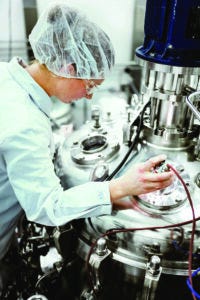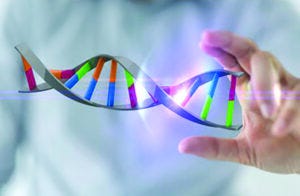- Sponsored Content
- Vaccines
30 Years in Microbial Manufacturing of Plasmid DNA, Vaccines, and Proteins30 Years in Microbial Manufacturing of Plasmid DNA, Vaccines, and Proteins
Sponsored by Richter-Helm

RHB employee HTTPS://WWW.RICHTERHELM.EU
Richter-Helm BioLogics is a first-in-class biopharmaceutical CDMO with strong quality and customer focus. With 30 years of experience manufacturing microbially derived products — including product classes such as therapeutic proteins and peptides, antibody formats (e.g., VHH nanobodies), bacterial vaccines, and plasmid DNA (pDNA) — the company has gained first-hand knowledge that can be applied easily to individual customer projects. That positions it as a preferred and experienced partner, especially for plasmid DNA projects.
Over the past few decades, Richter-Helm has developed from a small biotechnology company into a leading contract development and manufacturing organization (CDMO) with a strong focus on customer needs, timelines, and quality requirements. It was one of the first CDMO players in pDNA production 30 years ago. Always on the cutting edge in a constantly developing market, the company implemented a number of production processes for protein- and pDNA-based projects and developed in-house Pichia-based production processes.
The demand for current good manufacturing practice (CGMP)-compliant pDNA has grown over the years and led to Richter-Helm’s development of its proprietary, high-performance RHB-pART pDNA platform. The technology efficiently delivers pDNA products from 10-L to 1,000-L scales. Typically, the 200-L scale process leads to yields of 5–20 g, and yields of >100 g can be obtained at the 1,000-L scale. The final result is always a high-quality pure plasmid confirmed using high-resolution analytics. Currently operating three different production processes, Richter-Helm accommodates several product classes for different applications.
Trends in Microbial Biotechnology
Continuous growth of the biopharmaceutical industry and its need for flexible manufacturing solutions are ongoing trends driven by expanding numbers of drug candidates and strong interest in bringing such products to the market quickly. The COVID-19 pandemic has made those needs even more evident. The industry must react to such rapidly evolving diseases immediately to preserve human health and save millions of lives. These trends are likely to continue.
Local and regional shutdowns affected delivery of equipment and consumables throughout the CDMO landscape. Masks, cleanroom equipment, and disinfectants were in short supply, for example. With a warehouse of needed materials and high company-wide motivation to keep manufacturing, Richter-Helm lost no batches to such delays.
All biopharmaceutical products need to be produced at defined quality and quantities within set timelines. Candidates compete for limited production capacity around the world. Biomanufacturing takes place in highly complex multiproduct facilities, with capacities limited by the realities of a growing market that were exacerbated during the pandemic. As a result, the CDMO industry is growing and expanding its capacities as quickly as possible to compensate for the lack of biomanufacturing capacity. Richter-Helm currently operates two GMP-compliant production plants with bioreactor capacities of 1,000-L working volume, enabling manufacture of phase 1–3 clinical materials and commercial supplies. By adding two more bioreactors with capacities of 200 L and 1,000 L working volumes for microbial production, the company is reacting to the needs of the market.
Growth in the microbial manufacturing field is considered to be particularly strong, and the range of products it can make is expanding. Plasmid DNA and other product classes can be obtained from microbial sources: therapeutic proteins, peptides, some antibody formats, and bacterial vaccines. Such products can be used either directly as therapeutic agents (drug substances) or further processed into even more complex drug products.
One of the most important developments has been catalyzed by the COVID-19 pandemic. The new field of messenger RNA (mRNA) vaccines was developing rapidly already and now has achieved its first product approvals. This has moved pDNA production more into the focus of global interest and increased demand for microbial manufacturing processes.
In general, pDNA can be seen as the key to establishing new and life-changing therapeutic approaches. Plasmids are produced as critical raw materials for further processing and to serve as starting material for mRNA, treatments based on RNA interference (RNAi), cell and gene therapies, virus production, and cell-free expression systems. The pandemic certainly has increased demand for pDNA supplies. DNA plasmids also can be drug substances and vaccines, themselves. Over the near term, pDNA should realize its greatest growth in demand from late clinical trials into commercial applications, with the most potential in cell and gene therapy applications.
Different processes are used at different scales for different purposes. Plasmid products especially require an established and highly sensitive analytical platform, including a generic and validated quality control (QC) testing approach, as is in place at Richter-Helm. The company’s versatile analytical concept contains procedures to determine quickly and accurately not only pDNA content, but all other relevant quality parameters (e.g., isoforms and purity). For time-critical projects, this provides a reliable way to speed progress to clinical testing or to market.

HTTPS://STOCK.ADOBE.COM
Timely supply of pDNA of needed qualities and quantities is the main focus of Richter-Helm, which uses an established analytical platform for pDNA products that includes generic and validated quality testing. A high-quality purification with high concentrations and maintenance of supercoiled pDNA (>95%) is achieved. That provides a reliable way to enable fast time-to-clinic or -market for time-critical projects. The company’s high quality standards have been verified regularly by numerous customer audits as well as detailed inspections by major regulatory bodies: e.g., the European Medicines Agency (EMA), US Food and Drug Administration (FDA), Japan’s Pharmaceuticals and Medical Devices Agency (PMDA), Brazil’s Agência Nacional de Vigilância Sanitária (ANVISA), South Korea’s Ministry of Food and Drug Safety (MFDS), and more.
Organic Growth Through Technological Advancement
Over the past 20–30 years, microbial biotechnologies have represented a side niche of the CDMO industry. But because of ongoing developments in new therapeutic approaches such as mRNA, gene therapies, and chimeric antigen receptor (CAR) T-cell therapies, the pDNA market has experienced significant growth. Richter-Helm is contributing to the progress of major achievements through its rich history and unique knowledge base, its flexibility, and the high-quality GMP production it can offer. Expansion of the business comes through operations rather than mergers and acquisitions. The company plans to continue expanding its capacity over the long term and further offer reliable and highly specialized CDMO services to support the global pharmaceutical and biotechnological industries.
Thilo Kamphausen, PhD, is director of business development at Richter-Helm BioLogics GmbH & Co. KG, Suhrenkamp 59, 22335 Hamburg, Germany; 49-4331-1230-451; [email protected]; https://www.linkedin.com/company/richter-helm-biologics. Kai Pohlmeyer, PhD, is managing director; 49-40-55290-430; [email protected].
You May Also Like






